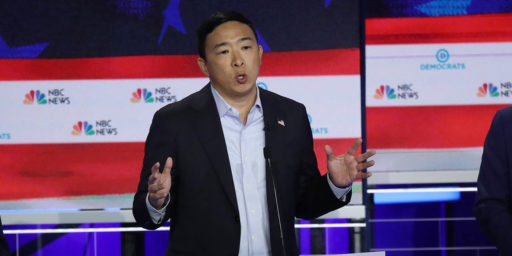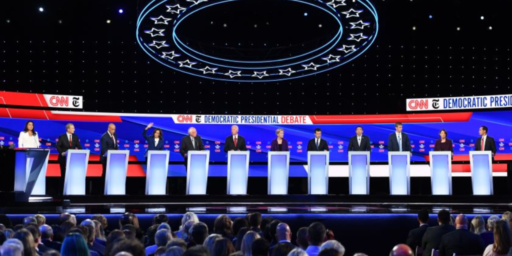In the South, Partisan Voting Gets Stronger
In the South, Partisan Voting Gets Stronger (Roll Call, $)
Are you ready for “premature partisan polarization� No, it’s not a medical condition that can be treated by Cialis, as Republican pollster Rob Autry joked at a conference here on Southern politics earlier this week. Rather, it represents a shift that is already having a major effect on American elections.
Surveys from 2004 show that voters have become less and less likely to cross party lines when voting for president or Members of Congress. Not only that — these voters were also paying attention, and quite possibly making up their minds, early in the election cycle.
Typically, voter interest in elections peaks in October and November. But according to Autry’s data, 63 percent of voters told pollsters in February 2004 that they were “very interested†in the election — 8 and 15 points higher than the percentage who had said they were very interested in October and November of 2000 and 1996, respectively. And in 2004, the degree of interest climbed all the way until Election Day, finishing up at a remarkable 74 percent.
While it’s possible that a confluence of unusual factors made 2004 unique, both Autry, of the firm Public Opinion Strategies, and Democrat Fred Yang of the firm Garin-Hart-Yang, agreed that early interest in elections has gone hand in hand with increasing party-line voting for federal offices. “Something has happened in the 21st century with President Bush and Democrats,†Yang told the conference, sponsored by the University of North Carolina’s program on Southern Politics, Media and Public Life. “It’s harder for Democrats in federal races to win crossover votes from Republicans.â€
Yang added that signs of heightened voter interest in the 2006 midterm elections are already showing up in early polls. “Democrats are saying they’ll vote for the Democrat, even if it’s someone they’ve never heard of, and Republicans are saying they’ll vote for a Republican, even if it’s someone they’ve never heard of,†he said. “This heightened partisan voting is starting at an extremely early stage.â€
Yang’s detailed analysis of exit polls for Southern states laid bare the challenge facing the Democrats in presidential and Congressional races. While the South may exaggerate national trends somewhat, it is not entirely divorced from political trends elsewhere. “The formula in the South for Democrats is that you try to get 90 percent-plus of the African-American vote and 40 percent of the white vote,†Yang said. “And typically, Democrats do better among white women than they do among white men.†But this longstanding gender gap, at least in the South, vanished in 2004, Yang said — evidence, perhaps, of the ballyhooed transformation of “soccer moms†into “security moms†after the Sept. 11, 2001, terrorist attacks. And the disappearance of this gender gap took with it Democrats’ hopes of winning federal races in the region.
Jokester Rob Autry is a friend of mine who works with The Girlfriend, both of whom are VPs at Public Opinion Strategies in Alexandria, Virginia.
That the South is becoming increasingly partisan is hardly surprising, since the country as a whole is becoming increasingly partisan. That it’s so decidedly Republican–with the notable exception of blacks–would have been surprising fifteen years ago, but not so much now.
What’s more remarkable to me is the fact that people are actually paying attention to politics. Those of us who are political junkies treat it the way baseball fanatics treat the offseason “Hot Stove League.” Most Americans, though, typically tune out politics until a month or so before a presidential election.




That’s the South is becoming increasingly partisan is because there are a lot fewer conservative Democrats running in the South that provide reasons for the voters there to split their tickets.
As a North Carolinian, I have commented similarly on this blog before. There is a total disconnect between the Federal Democrat party and the Southern Democrat party. Many Southern Democrats are pro-gun, pro-life, cutting taxes, pro-Iraq war, etc. The hateful, moonbat wing of the liberal Democrat party is simply sparse around here.